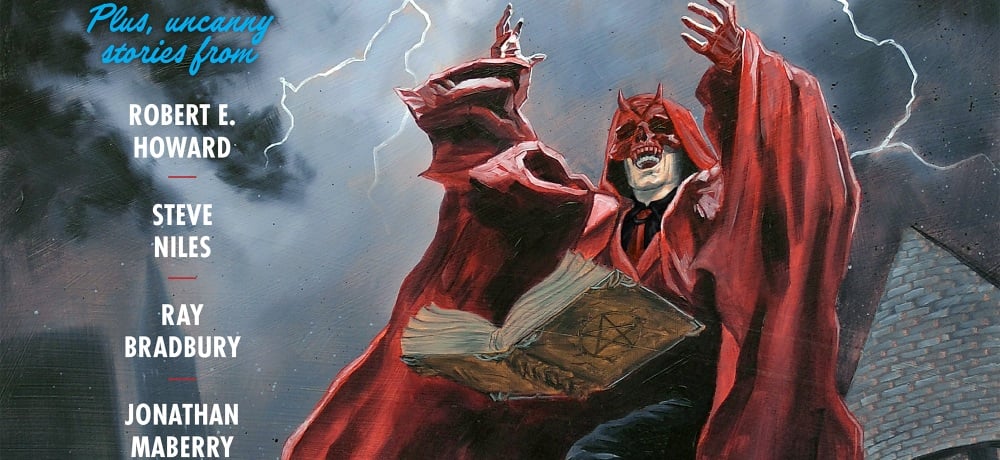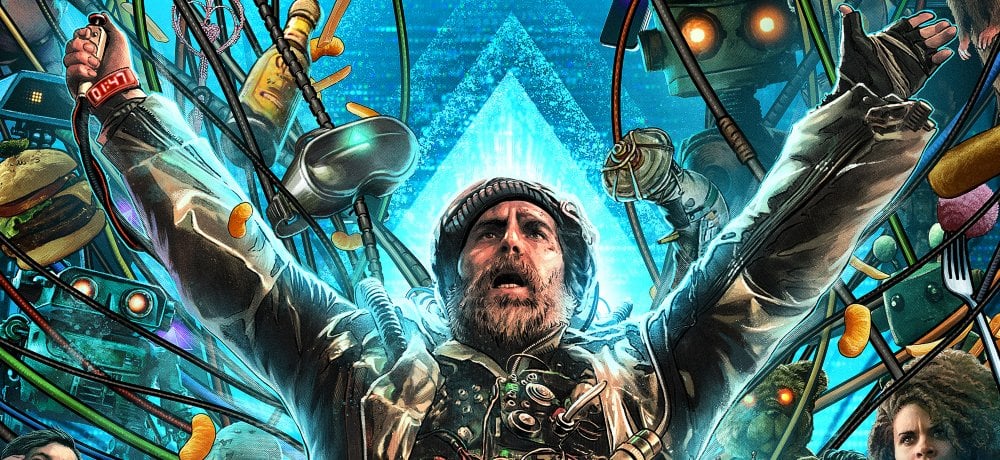





Back in June, the 2017 Los Angeles Film Festival took over Southern California, hosting screenings at numerous locations and featuring numerous genre films that horror and sci-fi fans should definitely keep on their radars in the coming months. Here are my thoughts on three of the movies that I had the opportunity to watch at the festival:
Replace: As far genre feature film debuts go, co-writer/director Norbert Keil has a lot to be proud of with Replace, a stunning and beautifully executed cinematic mystery that’s part body horror/part psychological thriller. Something of a hallucinatory fever dream at times, Keil has crafted an intriguing and chilling portrait of just how far some folks are willing to go in the name of vanity, and the whole affair is anchored by a trio of powerhouse performances by Rebecca Forsythe, Barbara Crampton, and Lucie Aron.
In Replace, we’re introduced to Kira (Forsythe), a young pianist who begins to suffer from a strange affliction that causes her skin to horrifically crack and peel away, and the only treatment for her maladies has deeply affected her memories, making it difficult for Kira to navigate her issues, unable to figure out which memories are real and which ones are just a side effect of her illness. Of course, everything Kira is contending with takes its toll on her psyche, but she finds comfort in the company of her neighbor, Sophia (Aron), who seems to know more than she lets on at first.
But Kira’s physician, Dr. Crober (Crampton), seems to know even more than she’s willing to divulge to her patient, and as Kira begins to put the pieces of the puzzle together surrounding her mysterious illness, she’s also forced to go to great lengths to fight the unknown disease ravaging her body and her youth.
As mentioned, Replace soars on the performances of its trio of actresses, especially newcomer Forsythe, who makes for an intoxicating and engaging protagonist who you still want to sympathize with even as her character begins to make some dark and disturbing decisions. On a visual level, Replace is brimming with haunting and stunning compositions reminiscent of the gauzy haze of Blade Runner, and I immediately fell in love with Replace’s score from Tom Batoy and Franco Tortora. For those who dig on mystery-infused psychological thrillers, be sure to see Replace as soon as you can.
Movie Score: 3.5/5
Midnighters: New Year’s Eve is supposed to be the time for new beginnings, but in Julius Ramsay’s Midnighters, the transitional holiday becomes the backdrop to a masterfully executed crime thriller that weaves an intricate story of deception, greed, and murder that truly kept me enthralled until Midnighters’ final moments, when we see how writer Alston Ramsay’s script eventually shakes out. Featuring a strong ensemble that includes Alex Essoe, Dylan McTee, Ward Horton, and Perla Haney-Jardine, Midnighters may be comprised of a lot of familiar elements that fans of suspense-centric cinema might recognize, but it’s Ramsay’s manipulation of those motifs that transform this movie into a craftier thriller than one might initially expect.
Midnighters starts off with stressed-out married couple Lindsey (Essoe) and Jeff (McTee) heading home from a NYE party, a bit tipsy and feeling somewhat amorous despite their recent struggles—both emotionally and financially. Before they know it, they hit a man in the road, and realizing the possible repercussions of the accident, the frantic and frazzled duo continue heading home with the unknown victim in the backseat of their car, desperately clinging to life. And while this setup may sound somewhat similar to Stuart Gordon’s criminally underrated Stuck, that’s when Midnighters takes a hard left turn, as Jeff and his wife realize that the guy they hit was actually on the way to their home, and he wasn’t showing up to wish them a Happy New Year, either.
That’s when we learn that Lindsey’s younger sister Hannah (Haney-Jardine) had been mixed up in a dangerous world that has followed her to her sibling’s domicile, and the issue of some missing money becomes a focal point in Midnighters, as no one can trust anyone and allegiances shift as greed rears its ugly head and drives a wedge right into everyone’s relationships.
A crafty potboiler that offers up more twists than a piece of rigatoni, Midnighters is wrought with a palpable tension that hits amazing heights during the film’s final 20 minutes, and while a lot of it is due to Alston Ramsay’s script, as a filmmaker, Julius Ramsay smartly relies on his entire ensemble to dig deep with these characters that might have felt a bit more like “stock characters” had they been in lesser hands. And as someone who digs on “bad-to-worse” experiences for characters in movies, Midnighters was immensely entertaining. Plus, if you first fell in love with Essoe in Starry Eyes, she’s just as great here, but in a much different role.
Movie Score: 4/5
Never Here: Writer/director Camille Thoman’s Never Here was easily the most thought-provoking film I saw during the 2017 LA Film Festival. While I will admit that I don’t 100% understand the direction Thoman was taking viewers throughout the course of her abstract thriller, what I do know is that I very much enjoyed the David Lynch-esque approach that Thoman utilizes to unfold the hypotheticals to her surreal exploration of deceit, identity, and voyeurism, and that Mireille Enos delivers a bold and powerful performance in Never Here that will stick with you for a long time after you’ve seen it.
In the film, Enos portrays Miranda, an avant-garde artist whose installations are so immersive, they take people into the lives of folks who may never had hoped to become an “art project” in the first place, which is how Never Here starts off. Miranda, feisty and determined, has recently infiltrated the life of an unwilling participant and put his life on display for the sake of her latest creative endeavor. Coincidentally, a woman is attacked right outside of Miranda’s apartment about the same time, and her newest installation is vandalized beyond repair. Suspecting that the subject of her latest visual project could potentially be somehow connected to these acts, Miranda embarks on a journey of trying to put all the puzzle pieces of this mystery together, but as she gets closer to her muse, the lines between curiosity and obsession begin to blur, leaving Miranda unable to decipher reality from her own twisted imagination.
As mentioned, Never Here is truly Enos’ film, and Thoman gives her plenty of room to shine, allowing the actress to give Miranda some real texture as a character whose obsessive nature and penchant for unwelcomed voyeurism leads her down a dangerous rabbit hole she might not be able to climb out of in the end. Enos’ male counterparts in Never Here also deliver solid work in the film, including Sam Shepard (who sadly just passed away a few weeks ago), Vincent Piazza, and Goran Visnjic, who leaves a memorable mark even with just a few minutes of screen time.
Considering this is her feature film directorial debut, Thoman has a lot to be proud of with her efforts on Never Here, and for those who dig on a non-traditional approach to crafting a psychological thriller, I’d highly recommend checking it out, if for nothing else but to see what you might come away with from your own viewing experience.
Movie Score: 3.5/5
Desolation: A stripped-down survival horror story that pits campers against a sinister and mysterious man stalking them in the woods, Desolation is a solid, albeit not hugely ingenious, directorial debut from Sam Patton, who smartly keeps his story simple and focuses on creating protagonists with some depth and layers to them.
In Desolation, we meet Abby (Jaimi Paige) and her son, Sam (Toby Nichols), who are grieving the loss of Michael, the patriarch of their family. The duo decide to honor the wishes of Sam’s dad and Abby’s spouse by heading out for a weekend in the wilderness to scatter his ashes in the place Michael loved the most when he was alive, and they bring along Abby’s longtime friend Jen (Alyshia Ochse) for some moral support. But as the trio treks through the woods, they realize they are not alone, as a weirdly bizarre man wearing sunglasses and carrying a walking stick has been following their every move. Knowing that danger is imminent, the trio set out to leave the forest, but the man who is only known as “The Hiker” has different plans in mind for Abby, her son, and her best friend.
And that’s pretty much it when it comes to Desolation, but honestly, the script from Matt Anderson and Michael Larson-Kangas doesn’t need a whole heck more to it because what they’ve crafted on the page is a beautiful portrait of folks in grief and what they must do to push through their pain so that they can move forward with their lives. The horror elements to Desolation are somewhat on the light side (there are some cool nightmare-fueled moments once “The Hiker” springs into action, but that only comprises about 20% of the movie), making the film’s antagonist feel more like a visual metaphor than a fully fleshed-out enemy to Abby and those she’s traveling with.
That being said, Desolation was made on a very limited budget and I applaud Patton for focusing on the things he could do right in this film, rather than trying to give viewers elaborate set pieces that his resources would be unable to sustain successfully. Desolation is a great first outing for Patton as a director (who comes from the Blumhouse world of indie filmmaking, and clearly was paying attention while working there), and I would eagerly check out future projects from him based on what the up-and-coming filmmaker was able to accomplish here. Desolation served as a great reminder to me that camping is just something I never need to do in my life. Ever.
Movie Score: 3/5